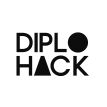At a Diplohack you will do something rather than just talk; you will add value, co-create and find solutions. These solutions can be digital, but don’t need to be, and can also result in high level concepts, new networks or other innovations.
A Diplohack brings together the unique skillsets of several fields (tech, NGOs, social entrepreneurs, enterprise) with those of diplomats.
A standard Diplohack usually lasts for a day and involve 30-50 people (but is flexible to other formats if needed).
A Diplohack aims at solving problems of global concern for the benefit of citizens worldwide or locally.
A Diplohack should involve a) either Dutch or Swedish diplomats (it’s a diplohack after all!), b) at least as many outside participants as diplomats, preferably more, and c) social entrepreneurship.
The challenge to be solved at a Diplohack needs to be a) clearly defined, b) solved in a limited time-frame, and c) solved through ideation and design process/hackathon/ideathon, preferably with process leaders from MakeSense (no space) or via their network.
It is important to plan for how the outcome of a Diplohack can be materialised/implemented/distributed. The outcome should be owned by one of the participants, but not diplomats. Diplomats can use resources to support the owner.
If you want to run a hackathon under the Diplohack banner, you can submit your event to Diplohack to coordinate and promote the event, use the logos and temporarily use the various social media channels. (The Diplohack homepage is owned and run by The Swedish and Dutch embassies in London (through Jon Pelling and Weijer Vermeer).
A Diplohack brings together the unique skillsets of several fields (tech, NGOs, social entrepreneurs, enterprise) with those of diplomats.
A standard Diplohack usually lasts for a day and involve 30-50 people (but is flexible to other formats if needed).
A Diplohack aims at solving problems of global concern for the benefit of citizens worldwide or locally.
A Diplohack should involve a) either Dutch or Swedish diplomats (it’s a diplohack after all!), b) at least as many outside participants as diplomats, preferably more, and c) social entrepreneurship.
The challenge to be solved at a Diplohack needs to be a) clearly defined, b) solved in a limited time-frame, and c) solved through ideation and design process/hackathon/ideathon, preferably with process leaders from MakeSense (no space) or via their network.
It is important to plan for how the outcome of a Diplohack can be materialised/implemented/distributed. The outcome should be owned by one of the participants, but not diplomats. Diplomats can use resources to support the owner.
If you want to run a hackathon under the Diplohack banner, you can submit your event to Diplohack to coordinate and promote the event, use the logos and temporarily use the various social media channels. (The Diplohack homepage is owned and run by The Swedish and Dutch embassies in London (through Jon Pelling and Weijer Vermeer).
